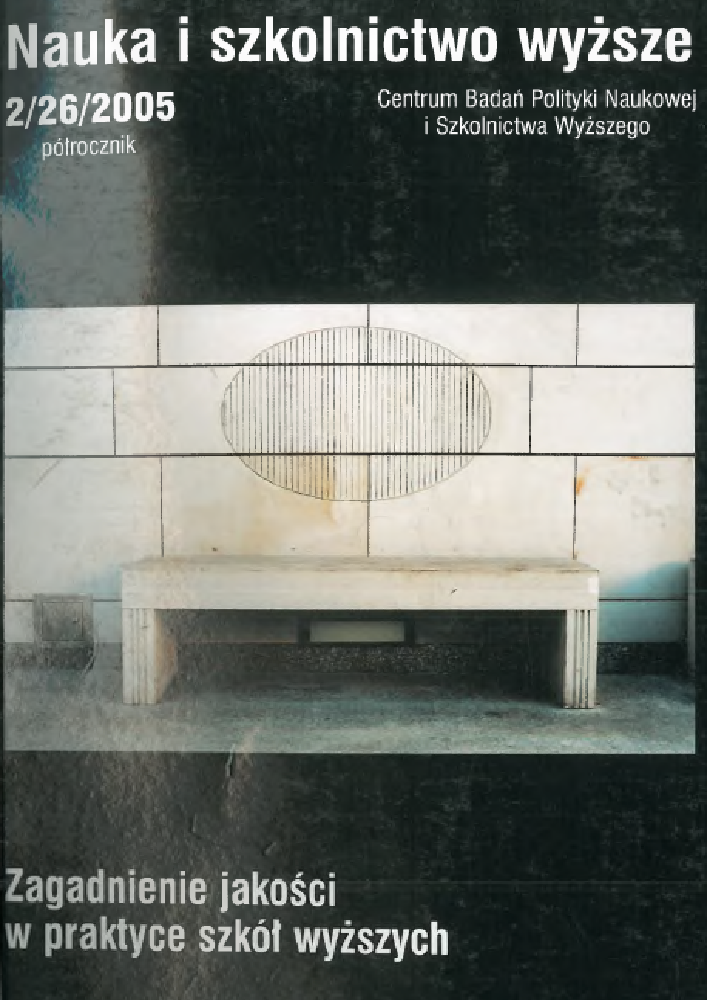Abstract
The mechanisms which shape the student population are extremely complex and complicated. As a result of various selection mechanisms, ever smaller percentages of young people reach subsequent levels of education. Key differentiating factors include: school performance, abilities, acquired skills, social and economic conditions in the socialising environment, any endeavours by educational institutions and individuals’ motivations and actions. The author is primarily interested in the recruitment procedure which is among the most crucial mechanisms that shape the student population. As it turns out, the procedure is not free of the influence of social factors. The article is based on research conducted during the recruitment procedure for a study programme in general sociology at the Nicolaus Copernicus University in Toruń. The analyses of mechanisms which shape the first year student population at the aforementioned university clearly indicate that the recruitment procedure rests on two platforms. On the one hand, most of the admittees were good students but, on the other hand, the screening procedure negatively selects candidates by gender and residential background.
References
Borowicz R. 1976 Selekcje społeczne w toku kształcenia w szkole wyższej, Instytut Rozwoju Wsi i Rolnictwa PAN, Warszawa.
Borowicz R. 2000 Nierówności społeczne w dostępie do wykształcenia. Casus Suwalszczyzny, Wszechnica Mazurska, Olecko.
Falski M. 1937 Środowisko społeczne młodzieży a jej wykształcenie, Nasza Księgarnia, Warszawa.
Jastrząb-Mrozicka M. 1974 Społeczne procesy wyboru studiów wyższych, Instytut Polityki Naukowej i Szkolnictwa Wyższego, Warszawa.
Kozakiewicz M. 1973 Bariery awansu poprzez wykształcenie, Państwowe Wydawnictwo Naukowe, Warszawa.
Szczepański J. 1963 Socjologiczne zagadnienia szkolnictwa wyższego, Państwowe Wydawnictwo Naukowe, Warszawa.
Szymańska D., Grzelak E., Hołowiecka B. 1997 Pochodzenie przestrzenne studentów UMK w Toruniu, Uniwersytet Mikołaja Kopernika, Toruń.
Świerzbowska-Kowalik E. 2000 Wykształcenie środowisk rodzinnych i miejsce zamieszkania jako wyznaczniki szans na podjęcie studiów, „Nauka i Szkolnictwo Wyższe”, nr 2/16.
Warunki... 2004 Warunki i tryb rekrutacji kandydatów na studia w roku akademickim 2004/2005, Uniwersytet Mikołaja Kopernika, Toruń.
Wasielewski K. 2002 Studia socjologiczne w opinii studentów na tle sporów o współczesny model wyższej uczelni, Uniwersytet Mikołaja Kopernika, Toruń (niepublikowana praca magisterska).
Wasielewski K. 2004 Młodzież wiejska na UMK w Toruniu, „Wieś i Rolnictwo”, nr 1.
Wittlinowa H. 1937 Atlas szkolnictwa wyższego, Ministerstwo Wyznań Religijnych i Oświecenia Publicznego, Warszawa.
